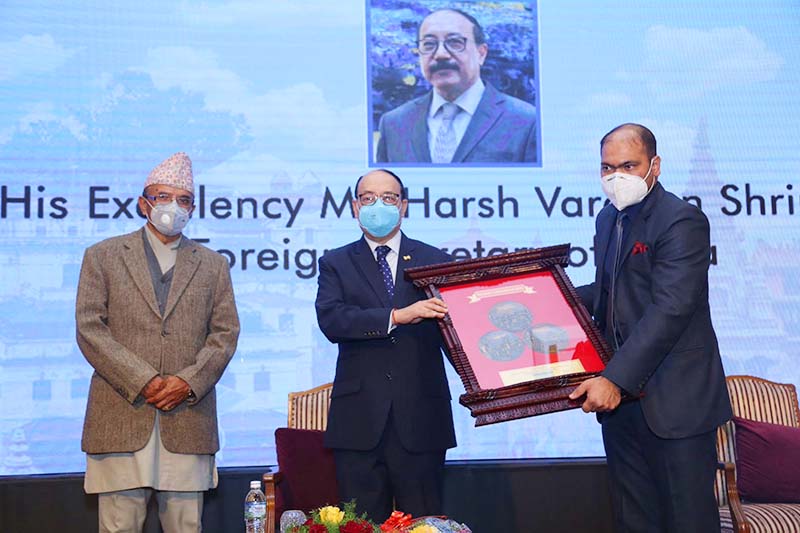Nepal on priority for COVID-19 vaccine: Shringla
KATHMANDU, NOVEMBER 27
Indian Foreign Secretary Harsh Vardhan Shringla has assured the people of Nepal that, once a COVID-19 vaccine is rolled out in India, meeting Nepal’s requirements would be a priority for India. Addressing a talk programme organised by Asian Institute of Diplomacy and International Affairs here today Shringla said India had at least five promising COVID-19 vaccine candidates at advanced stages of trials.
Together we will recover from the pandemic and together we will protect our people, he added.
We were too glad to extend assistance to Nepal in dealing with the COVID-19 outbreak, be it in equipment and supplies, or ensuring uninterrupted flow of goods across the border. I would like to emphasise our continued and uninterrupted commitment to Nepal, the Indian Foreign Secretary said.
He said during the COV- ID-19 pandemic period, Nepal and India had been together.
Shringla said for India, Nepal was fundamental to India’s ‘Neighbourhood First’ approach. He said,”Our aspiration of Sabka Sath, Sabka Vikas, Sabka Vishwas and your goal of Samriddh Nepal, Sukhi Nepali are entirely compatible.”
We are dreaming of a new India, and we are dreaming with our eyes wide open – we are persisting with efforts to realise these dreams. We would like our friends in Nepal to share our dreams and be a part of this journey. In our region, our South Asia, we are symbiotically linked. We need each other, he argued.
“He said Nepal-India relationship was intricate and existed in various paradigms.
“We share the same geography, civilisational heritage, culture and customs. There are affinities in religious and spiritual traditions, even food habits. The people-to-people linkages are so strong and so powerful that quite frankly we in government only complement these,” he said.
As Prime Minister Narendra Modi put it during when he visited Nepal two years ago, “India’s relations with Nepal are familial and friendly, which stand on the strong foundations of mutual and deep relationships between its people, which are much above the relationship between the two governments.”
He said India’s development and modernisation were incomplete and intrinsically and symbiotically linked to the development and modernisation of neighbouring countries such as Nepal.
The Indian foreign secretary said the impression that he was carrying back home after his meetings here with the president, the prime minister of Nepal, and other dignitaries was that the two countries were on the same page and shared the same vision.’ “I must acknowledge here that the welcome that my delegation and I have received. It has been moving and memorable,” he added.
Aside from our common civilisational inheritance, India’s relationship with Nepal rests on four pillars – development cooperation; stronger connectivity; expanded infrastructure and economic projects; easier and enhanced access to educational opportunities in India for the young people of Nepal. Underlying all of these is a steadfast principle: we will work to Nepal’s priorities, Shringla said.
Shringla said as a neighbour and friend, India saw itself as Nepal’s natural and instinctive responder in the times of crisis.
“The devastating earthquake of 2015 was a test for the people and Government of Nepal. The courage and resilience of the citizens of Nepal, the grit and determination in rebuilding lives and livelihoods, was an inspiration for us in India and across the world. On our part, we were happy to contribute to this process, as first responder and then towards long-term reconstruction,” he added.
The Indian Foreign Secretary said the outlay of Indian earthquake-related assistance was $ 1 billion but its true value was not in monetary terms and it lay in how it had helped communities on the ground.
To cite an instance, 46,000 houses have been built in Gorkha and Nuwakot. They incorporate earthquake-resilient technologies in line with your motto of ‘Build back better’ and they epitomise humanity’s ability to triumph over adversity, he added.
Shringla said India’s market was available to Nepal – to Nepali companies, Nepali startups, and teeming talent pool.
Nepal’s hydropower potential can be a major source of clean energy for the subcontinent, and an economic game changer for your country. Together we can find solutions to climate change and environmental concerns that trouble us, he said. Shringla said enhancing cross-border connectivity and infrastructure projects were critical as these projects unlock potential of millions and in millions.
Founder of AIDIA Sunil KC said that cultural and historical inter-linkages, economic interdependence, cross-border migration, mutual security concerns were some of the primary features of Nepal-India relations and where the two countries need to work closely for achieving shared interests.






